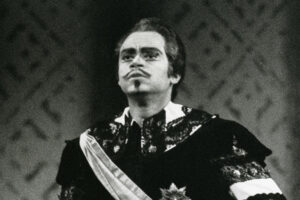

This afternoon’s group was rather lopsided: there were only three women. Lauren Feider chose as her first piece the finale from Arabella, but her voice had neither the float nor shimmery brightness that the music demands. Her second selection from Peter Grimes was more successful (she was the one singer with halfway intelligible English diction) but she failed to make an impact.
Yelena Dyachek sang “Come scoglio” and the Letter Scene from Eugene Onegin. In both selections she displayed a clear, well-produced soprano and she handled the octave jumps in “Come scoglio” well. Her Letter Scene was bizarre — she was smiling like a cheerleader throughout and there was little to no characterization. But her healthy sounding soprano sound was enough to win over both the audience and judges.
The other female winner was a head-scratcher. Emily D’Angelo is very young (only 21) and her mezzo voice has a basically nice timbre, but her two numbers just displayed her relative immaturity. “Contro un cor” was sung with a rather serious disposition with none of that Rossini minx sparkle, and then she trudged through a listless rendition of the overdone “Must the winter come so soon?” aria from Vanessa. Her English diction was such that you really couldn’t tell what language she was singing in. But she must have done something to impress the judges, because she was the other female winner of the afternoon.
The group of men was much more interesting. There were four baritones in the running and all of them could have won. Unlike the relatively muted audience appreciation for women, all the men had the audience bravo-ing loudly. Brian Vu had an endearing smile and an equally sweet voice. However he was defeated by the rapid patter of “Largo al factotum” — he seemed to get completely lost and had to “re-enter” the score a few times.
Valentin’s turgid aria from Faust lay too low on his high, almost baritenor sound. But he has potential. Another baritone who didn’t walk away with the prize was Theo Hoffman. He was small in stature but not in voice. His aria from Die Tote Stadt was gorgeous. My friend shook her head—she was certain he’d win, as was I.
Sol Jin (from S. Korea) opened his mouth and the audience gasped. This was not a light lyric baritone, but a rich, sonorous voice that had a future beyond Papageno, Marcello and the other typical starter baritone roles. He sang “Di provenza il mar” and “Ya vas lyublyu” (from Queen of Spades) almost as a sign of supreme confidence in his vocal cords.
He seemed to be making a statement that he could indeed throw down with the memories of Robert Merrill or Dmitri Hvorostvosky or any other baritone past, present and future. In the audience Mariusz Kweicien could be seen applauding enthusiastically. No surprise he was a winner. He also has his own youtube channel.
Sean Michael Plumb was maybe the ringer of the competition. A quick look at his bio indicates he’s already had professional experience in Munich, Glimmerglass, and upcoming engagements in Salzburg. It’s easy to see why — if you were to look up “barihunk” in the dictionary, you’d see a picture of Sean Michael Plumb. His voice is also a slightly generic, if pleasant lyric baritone. He didn’t have quite enough voice for Robert’s air from Iolanta but was delightful in “Bella siccone un angelo” from Don Pasquale. He’s a cute baritone with a voice. Sign him up for those Papagenos.
The one tenor in the competition, Jonas Hacker, attempted Belmonte’s aria. He started off gingerly, in a sort of mechanical way, but it became clear that he really didn’t have the breath control for this piece and he ended up yelping more than singing. A second selection (“Prendre le design d’un bijou”) from Lakmé was pleasant enough but wasn’t enough to overcome the impression that this tenor was not quite ready for prime-time.
There was even a countertenor! Polish countenor Jakob Józeph Orlínski first sang a selection from Midsummer’s Night Dream that showed off his almost celestial-sounding voice. Unfortunately the English was even more unintelligible than the other English sung arias in the competition. But he proved with his second selection (“A dispetto d’un volto ingrato”) from Handel’s Tamerlano that he’s also capable of the extravagantly ornamented, da capo fireworks that’s so craved by baroque fans. So no surprise that he won. One weakness: very aspirated coloratura.
After the singing the judges conferred while host Deborah Voigt talked to the audience in that chatty, breezy way that makes her a natural for HD hosting. Eric Owens killed more time with “O tu, Palermo” from I Vespri Siciliani. Then the winners were announced. I saw that the people around me had done what I did, which was star their picks as winners. Only the choice of Emily D’Angelo surprised me. Overall it was a fun afternoon and I look forward to these singers becoming “artists,” as La Netrebko would say.
























Comments